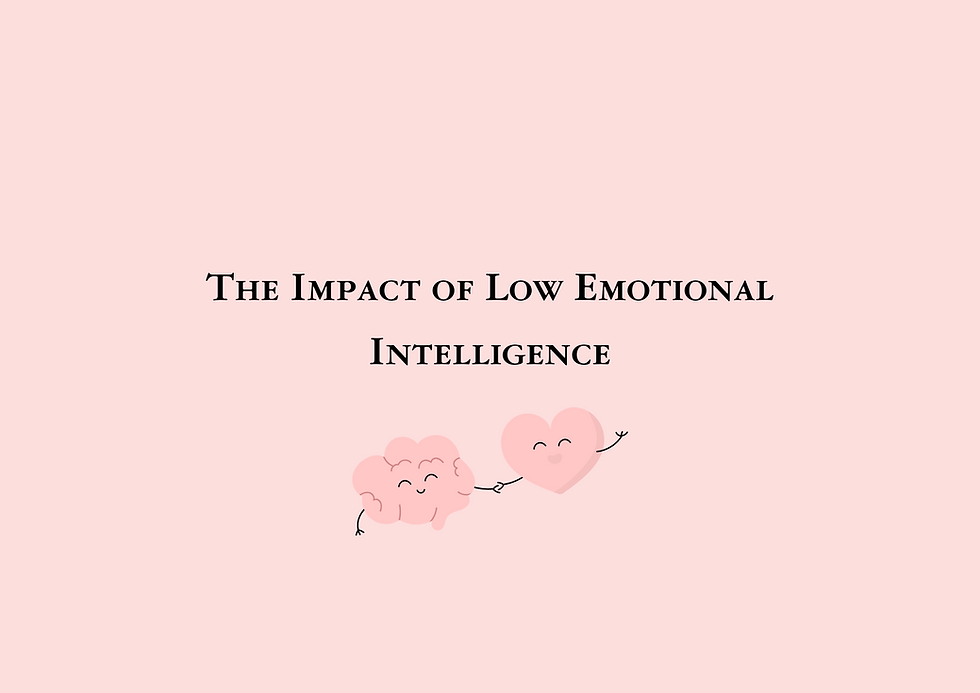The Impact of Low Emotional Intelligence
- Midnight Musingz
- Feb 5
- 3 min read
Updated: Feb 11

Low Emotional Intelligence and its Consequences
A low level of emotional intelligence (EQ) can negatively impact personal relationships, career growth, mental health, and overall well-being. It often leads to communication breakdowns, difficulty empathizing with others, and increased social isolation. Emotionally unaware individuals may struggle with stress management, leading to anxiety, depression, and low self-esteem. Poor decision-making, impulsivity, and an inability to resolve conflicts can further hinder personal and professional success. However, emotional intelligence can be developed through self-awareness, empathy, and emotional regulation. By improving EQ, individuals can enhance their relationships, excel professionally, and build a more fulfilling life. Learn how low EQ affects different aspects of life and take steps toward emotional growth for a healthier, more connected future.
Low Emotional Intelligence (EQ) affects various aspects of life, often creating obstacles in personal relationships, career advancement, and overall well-being. Below are deeper insights into the consequences of low EQ:
1. Strained Personal Relationships
Communication Breakdowns: Misunderstanding emotions and failing to articulate them effectively can lead to frequent arguments and unresolved conflicts.
Lack of Emotional Connection: Difficulty empathizing with others often results in shallow relationships that lack trust and emotional depth.
Increased Isolation: Over time, low EQ can cause people to withdraw socially due to negative interactions or fear of emotional vulnerability.
2. Professional Challenges
Poor Team Dynamics: Low EQ hampers collaboration and rapport, as individuals may struggle to understand colleagues' emotions or viewpoints.
Ineffective Leadership: Leaders with low EQ may fail to inspire or connect with their teams, leading to reduced morale and productivity.
Career Stagnation: A lack of adaptability, communication skills, and emotional awareness can prevent individuals from thriving in fast-paced, dynamic work environments.
3. Mental Health Struggles
Increased Stress: Inability to manage emotions effectively leads to heightened stress levels, which can manifest as physical symptoms like headaches, fatigue, and illness.
Anxiety and Depression: Poor self-regulation and low resilience make individuals more prone to mental health challenges, affecting their overall quality of life.
Lower Self-Esteem: Constant emotional missteps can result in self-doubt, eroding confidence over time.
4. Hindered Decision-Making
Impulsive Choices: Without the ability to regulate emotions, individuals may make hasty decisions driven by anger, fear, or frustration.
Overthinking and Paralysis: Conversely, low EQ can also cause people to overanalyze emotions, leading to indecision and missed opportunities.
5. Poor Conflict Resolution Skills
Escalated Disputes: Individuals with low EQ often lack the tools to de-escalate conflicts, leading to prolonged disagreements and damaged relationships.
Inability to Compromise: A rigid approach to problem-solving can hinder finding mutually beneficial solutions.
6. Limited Personal Development
Resistance to Change: Low EQ often correlates with a fixed mindset, making it harder to embrace growth or learn from experiences.
Difficulty Setting Goals: Emotional unawareness can make it challenging to identify personal aspirations or stay motivated to achieve them.
7. Impact on Parenting
Lack of Emotional Support: Parents with low EQ may struggle to recognize and validate their children's emotions, which can impact the child’s emotional development.
Ineffective Discipline: Overreactions or inconsistencies in managing children’s behavior may create confusion or foster resentment.
8. Broader Social Implications
Weak Community Ties: Low EQ in groups or communities can reduce empathy and collaboration, creating environments of mistrust and disconnection.
Workplace Toxicity: Teams or organizations with low EQ members may experience higher rates of conflict, burnout, and turnover.
By addressing low EQ and striving to improve, individuals can reverse these negative effects, fostering healthier relationships, career success, and emotional well-being. Developing emotional intelligence is not just a personal journey but one that positively impacts everyone in an individual’s circle.
Ready to develop your emotional intelligence? Explore our resources, take an EQ assessment, or join our community to continue learning and growing!

ความคิดเห็น